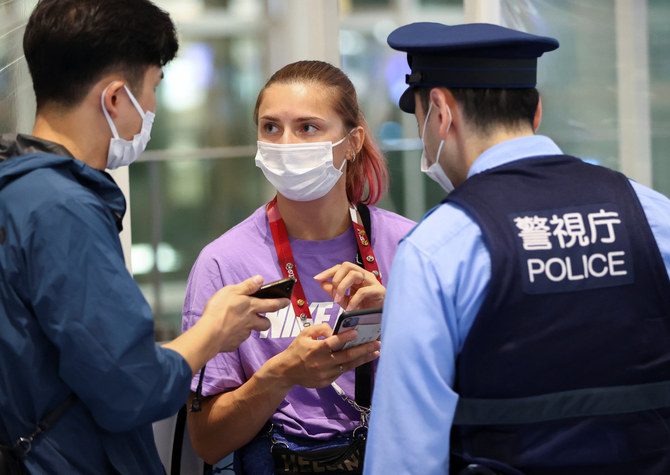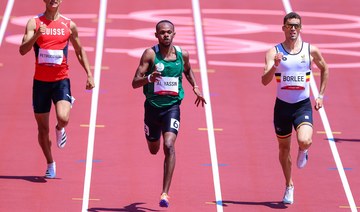TOKYO : A Belarusian sprinter refused to get on a flight from Tokyo on Sunday after being taken to the airport against her wishes by her team following her complaints about national coaching staff at the Olympic Games.
Krystsina Tsimanouskaya, 24, sought protection from Japanese police at Haneda airport late on Sunday. Early on Monday, Japanese lawmaker Taiga Ishikawa tried to visit her at the sub-precinct at the airport but police told him she was no longer there.
Ishikawa, an opposition member of the Upper House of parliament, told Reuters a police officer declined to tell him where the athlete was. Police did not comment to reporters, who had been waiting through the night and not seen Tsimanouskaya depart.
The International Olympic Committee earlier said it had spoken to Tsimanouskaya and that she was being accompanied by a Tokyo 2020 staff member at the airport.
“She has told us she feels safe,” the IOC said in a Twitter post.
Tsimanouskaya spent the night in an airport hotel, IOC spokesperson Mark Adams said at media conference.
Adams said the IOC and Tokyo 2020 would continue their conversations with Tsimanouskaya and the authorities “to determine the next steps in the upcoming days.”
The incident on Sunday highlighted discord in Belarus, a former Soviet state that is run with a tight grip by President Alexander Lukashenko. In power since 1994, he faced a wave of protests last year, which some athletes joined.
Tsimanouskaya said coaching staff had come to her room on Sunday and told her to pack. She said she was then taken to Haneda airport by representatives of the Belarusian Olympic team.
But she refused to board the flight, telling Reuters in a message over Telegram: “I will not return to Belarus.”
The Belarusian Olympic Committee said in a statement coaches had decided to withdraw Tsimanouskaya from the Games on doctors’ advice about her “emotional, psychological state.”
The committee did not immediately respond to a request for additional comment.
Earlier, a Reuters photographer saw the athlete standing next to police at the airport. “I think I am safe,” Tsimanouskaya said. “I am with the police.”
In a video published on Telegram by the Belarusian Sport Solidarity Foundation, Tsimanouskaya asked the IOC to get involved in her case.
A source at the foundation, which supports athletes jailed or sidelined for their political views, said Tsimanouskaya planned to request asylum in Germany or Austria on Monday.
The foundation’s head, former Olympic swimmer Aliaksandra Herasimenia, told Reuters Tsimanouskaya could also be receiving assistance from Poland.
“We appealed to a number of countries for help,” said Herasimenia, a three-time Olympic medallist. “But the first that reacted was the Polish consulate. We are ready to accept their help.”
Lukashenko’s son, Viktor Lukashenko, is president of the Belarus Olympic Committee.
'Coaches' negligence'
Tsimanouskaya ran in the women’s 100 meters heats on Friday and was scheduled to run in the 200 meters heats on Monday, along with the 4x400 meters relay on Thursday.
She said she had been removed from the team due “to the fact that I spoke on my Instagram about the negligence of our coaches.”
Tsimanouskaya had complained on Instagram that she was entered in the 4x400m relay after some team members were found to be ineligible to compete at the Olympics because they had not undergone a sufficient amount of doping tests.
“Some of our girls did not fly here to compete in the 4x400m relay because they didn’t have enough doping tests,” Tsimanouskaya told Reuters from the airport.
“And the coach added me to the relay without my knowledge. I spoke about this publicly. The head coach came over to me and said there had been an order from above to remove me.”
The head of the Belarus athletics team in Tokyo, Yuri Moisevich, told state-owned broadcaster STV the decision had been taken to make changes to the relay team, but they did not announce it immediately so as not to disrupt the athletes’ preparation.
“We intended to tell her everything, to explain it, especially as she was a reserve,” Moisevich said.
Exiled Belarusian opposition leader Sviatlana Tsikhanouskaya urged the IOC to take up the athlete’s case.
“She has a right to international protection & to continue participation in the @Olympics,” Tsikhanouskaya wrote on Twitter. “It is also crucial to investigate Belarus’ NOC violations of athletes’ rights.”
Tsikhanouskaya later compared the incident to the forced landing of a Ryanair jet in Minsk in May to arrest dissident blogger Roman Protasevich and his girlfriend, and proposed that all those involved in the “attempted kidnapping” of Tsimanouskaya be added to EU and US sanctions lists.
“No Belarusian who has left Belarus’ borders is safe because they can be kidnapped, just like Krystsina Tsimanouskaya or Roman Protasevich,” she wrote on Telegram.
Vitaliy Utkin, a member of the Belarusian parliament, criticized Tsimanouskaya’s behavior.
“It is betrayal and treachery, which was directed toward the Belarusian people and her fellow athletes,” STV cited Utkin as saying.
Athletes failed
President Lukashenko was faced with mass street demonstrations last year over what his opponents called rigged elections, and ordered a violent crackdown on protesters. The president denies the allegations of vote-rigging.
Unusually in a country where elite athletes often rely on government funding, some prominent Belarusian athletes joined the protests. Several were jailed, including Olympic basketball player Yelena Leuchanka https://www.reuters.com/article/us-belarus-election-basketball-idUSKBN27... and decathlete Andrei Krauchanka https://www.reuters.com/article/us-belarus-election-olympics-idUSKBN28614P.
Others lost their state employment or were kicked off national teams for supporting the opposition.
During the Cold War, scores of sports people and cultural figures defected from the Soviet Union and its satellite states during overseas competitions or tours. But the freedom of travel that came with the fall of the Soviet Union in 1991 saw the need for such dramatic acts dwindle.


















